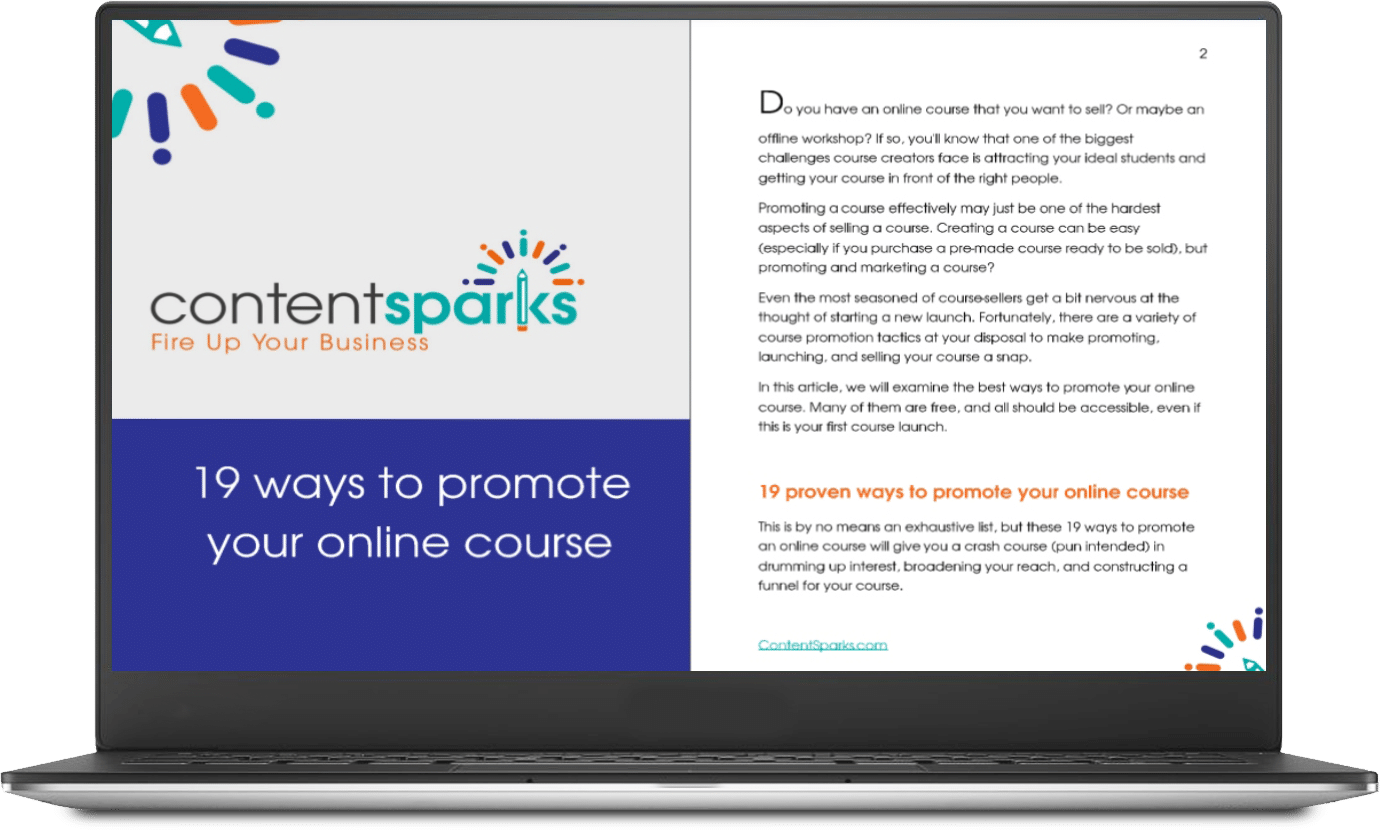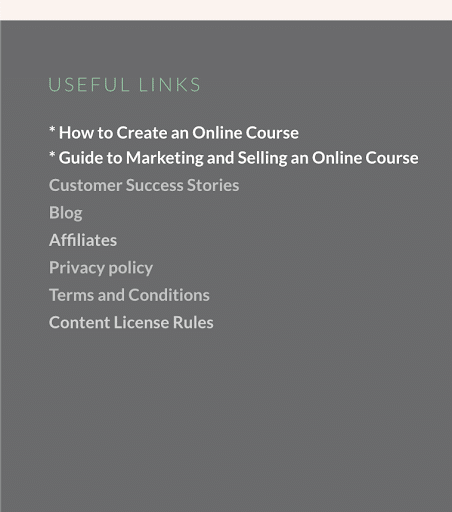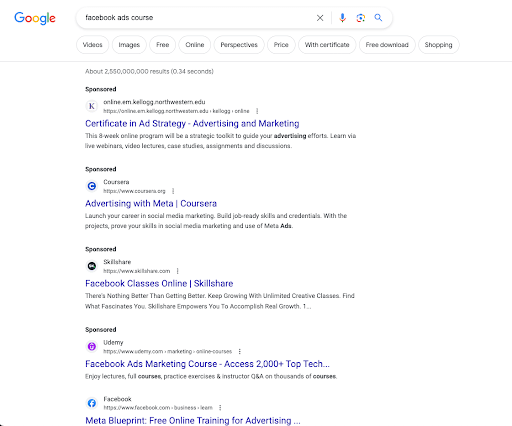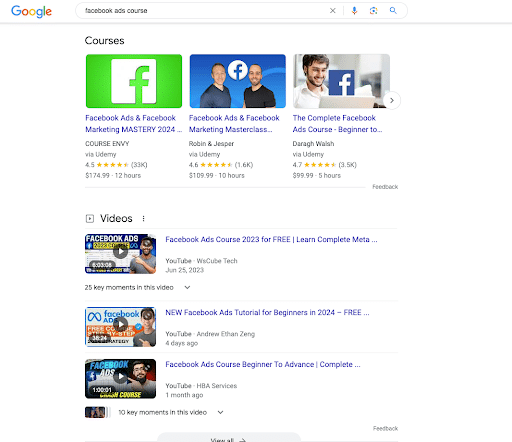Subtotal: $297.00
How to Use SEO to Sell Courses Online
0 comments
0 comments
You have a course hot off the press, but how are you going to launch it?
When launching a new online course there is no shortage of tactics you can use to promote it. In this guide, I am going to give you a blueprint for using SEO (search engine optimization) to launch your next online course to the top of Google’s search results. That way, it will be front and center in your customers’ eyes when they search for your topic..
SEO is extremely competitive, but it can be one of the best ways to promote your courses as you build your website’s authority over time.
Read on and you’ll become an SEO master!
SEO is an acronym for “Search Engine Optimization.” It’s the process of creating content and optimizing your website so that it shows up higher up in search engine results.
When most people think about SEO, they think about Google. There’s a good reason for that - Google is by far the most popular and used search engine. Don’t discount Bing though which has a decent amount of usage (and got some good press for their AI features in 2023).
SEO has been around for decades, but as the web has grown and become more crowded it’s become increasingly competitive - which means standing out from the crowd is key if you want this course promotion tactic to succeed.
If SEO isn’t on your priorities list, you could be missing out – chances are your customers are on Google right now!
Google processes 5.9 million searches every minute. That’s just Google; I’m not including other search engines like Bing or DuckDuckGo! Despite the hoopla over tools like ChatGPT, search engines haven’t been dethroned yet as the primary way that people get answers to their questions and buy products online.
If you can make it to page 1 of Google then SEO can be a major semi-passive traffic and revenue generator for your business.
While there’s a very good chance your target customers are using Google regularly, SEO isn’t for everyone – at least not right off the bat.
Here’s when not to use SEO to promote your online courses:
Still think SEO is a good marketing channel for you? Keep reading to learn some SEO tactics you can use to promote your next course.
I could easily write an eBook hundreds of pages long detailing how to do SEO for an online course, but I’ll leave you with my best tactics for now.:
Optimize Your Website for Technical SEO
Technical SEO is one of the simplest things you can start with when it comes to optimizing your website for Google.
Don’t worry, technical SEO doesn’t (always) require the help of a developer. But if you have a tech-savvy friend, maybe offer them a free lunch or cup of coffee in exchange for some help. By technical SEO I mean focusing on how your website performs, and how easy it is for Google to access it. Optimizing for technical SEO means focusing on things like:
Now grab that cup of coffee (and a tech-savvy friend) and knock these items out first. It’ll set up everything that follows for success.
Anyone can load up a keyword research tool, generate a big list of keywords, and call it a content strategy.
Here’s a secret - because “anyone” can do that, everyone is. And it’s causing a lot of websites to target the same keywords with more or less the same content. The result? They all get lost in the noise and never seen.
If you want to stand out and rank high up in search results, focus on the questions your target audience is asking rather than relying just on a keyword research tool. I like to take a step back from my computer screen and ask the following questions:
Here’s a quick example: Suppose you run a social media marketing agency and want to launch a course on Facebook ads.
Well, the bottom of your funnel will center around your course so the keywords to target likely will be variations of “Facebook ads course.” As you go further up the funnel, think about the learning objectives of your course and what you help your audience do. You’ll probably run into questions like:
Questions like these are asked by people who know they have a problem (managing a Facebook ad) but are not yet aware of the solution (your course). You can create content that answers these questions, and place a CTA in your content to purchase your course (or your services!).
The web is drowning in content, so to stand out you need to go further than the old standard of a 500-word blog post.
In 2023 Google launched the “helpful content update” which looks for content that is actually useful rather than content that meets a certain word count.
Not too long ago Google introduced a principle called EEAT which stands for:
This is a set of guidelines for creating authoritative content that helps your readers. Not only does this answer their questions better, but it’s also way better at converting them into customers.
Here are some tips for improving the authority of your content:
Create content with your target audience in mind and you can’t go wrong.

Want 20 ways to promote your online course?
Grab a handy PDF of the 20 ways to promote your online course now...
My favorite way to level up content is to organize it into “topic clusters” for a major ranking boost.
Topic clusters are groups of related content on your website around a core topic. Most websites have their content on blogs, but the problem with keeping your content limited to a blog is as you publish more content, your older blog posts get pushed down and are never found.
By leveraging topic clusters, related blog posts link to each other - making it easier for your readers (and Google) to view content that is related. You can level up your topic clusters by creating a pillar page as well, this is a lengthy in-depth guide that links out to all of your related posts in the topic cluster.
For example, I created a few pillar pages that I feature in the footer menu on my website and I’ll add to those over time:

Remember that keyword example from earlier? That social media agency could create an “Ultimate Guide to Creating Facebook Ads” as a pillar page that links out to and connects several blog posts that answer different questions about setting up Facebook ads.
You can learn a lot based on the first page of Google search results for the keyword you want to target.
Let’s use our social media marketing example one more time. When I Google “Facebook Ads course” the first thing I see is a group of four ads:

Below it, Google adds some interesting new sections to the search results - note a section for “Courses” and another for “Videos:”

That there are so many ads for this keyword tells me there is commercial value behind it - people are willing to spend lots of money just to appear on Google (a good sign for bottom-of-the-funnel content). That Google shows courses and videos presents an interesting opportunity for other content - yes a landing page can rank here, but don’t discount a well-optimized YouTube video or Udemy course.
Let’s move up the funnel, here’s the results for “How much to budget for Facebook ad:”

There’s just one ad here (from Facebook), and Google altered the search results to show a “featured snippet” right above the “People Also Ask” section. This tells me that this is an “informational” search which means the searcher isn’t looking to buy something (yet).
Taking 5 minutes to Google the keyword you want to target can tell you so much about the type of content to rank as well as guide you to ensure your content has a good chance of ranking highly. In SEO they call it a SERP analysis (search engine results page analysis). I like to include it in my content process when writing new content for my blog or a course page.
Looking to build that elite SEO strategy on a budget? I’ve got you covered. Here are some free tools I recommend using to get started with SEO:
There’s a lot to SEO, but with a few free tools, you can get pretty far in building a strategy that aligns with your customers and launches your courses to the top of Google.
Follow these tips and nothing is stopping you from ranking your course at the top of Google.
Need more course promotion tactics? Check out my guide with 19 ways to promote your course online.
SEO is a fantastic channel, but it’s just one marketing channel in your toolkit. Pair it with others like ads, podcasting, or an email list and you have a comprehensive marketing strategy that will launch your course (and business) to the next level.
Enjoy!

Tags